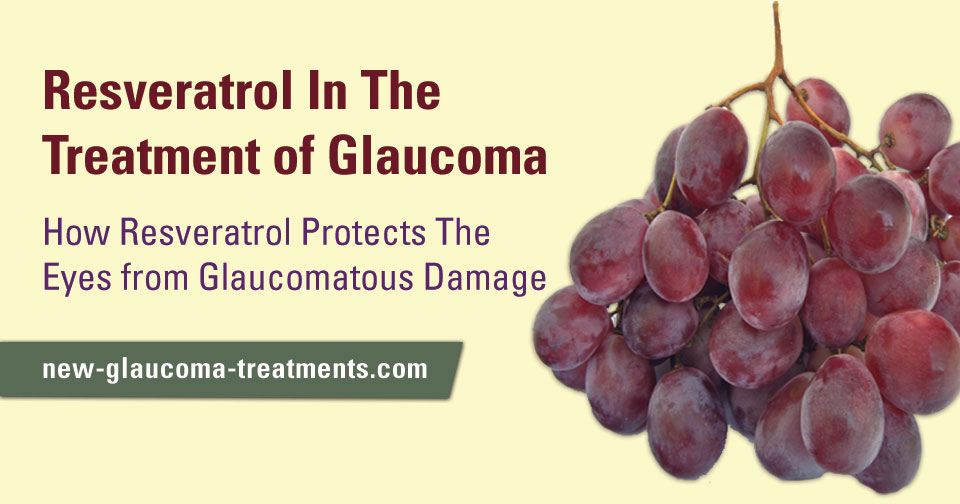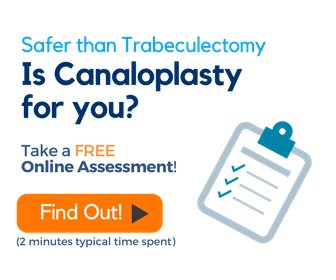
Resveratrol Protects the Trabecular Meshwork from Glaucomatous Damage
What is Resveratrol?
Resveratrol is naturally found in the skin of grapes and the wine made from those grapes[1]. It can also be found in Açai berries,[2] grape tomatoes, peanuts,[3] plums, and raspberries. It is most well-known for its possible role in extending lifespan. The evidence supporting this benefit, however, is based on fruit fly (not mammalian) research. Thus, it’s a stretch to believe that humans could derive the same life-extending benefit from Resveratrol as do fruit flies.
Although Resveratrol is well absorbed from the gut, very little of it makes it into the general bloodstream. This is because the liver inactivates the vast majority of what is absorbed.[4] Once past the liver, however, Resveratrol appears to be able to pass the blood-brain barrier and enter brain tissue.[5]
Evidence that Resveratrol can be effective in the treatment of Glaucoma
Laboratory evidence suggests that Resveratrol can protect neurons from the toxic effects of inflammation.[6] It has also been shown to increase cerebral blood flow as well as provide a neuroprotective effect.[7] This neuroprotective benefit appears to be enhanced when both Resveratrol and Melatonin are present.[8] Resveratrol also appears to have antioxidant properties.[9]
Intraocular pressure (IOP) elevation in the most common form of open angle glaucoma is thought to be due to malfunction of the eye’s drainage grate (trabecular meshwork). This malfunction is known to be associated with certain biochemical markers of inflammation[10] and oxidative cellular damage.[11] One laboratory study demonstrated that Resveratrol was able to decrease these markers in trabecular meshwork cell culture models of oxidative damage.[12]
UPDATE: In the March 2020 issue of Investigative Ophthalmology & Visual Science, Kejia Cao and colleagues published their results of a lab experiment demonstrating that Resveratrol protects retinal ganglion cells in an induced mouse model of ocular hypertension.
Source: iovs.arvojournals.org
Potential Side Effects and Risks:
Resveratrol appears to be safe when taken in doses commonly available in over-the-counter supplements. Indeed, when taken in amounts up to 5,000mg per day the only observable side effects were gastrointestinal upset[13] and nausea.[14]
A Caution for those with Hormone Sensitive Cancers or Conditions[1]
Resveratrol has a structure that is similar to estrogen. As such, it may alter estrogen metabolism.[15] Women with the following conditions should in general avoid use of Resveratrol: breast, uterine, and ovarian cancer, as well as endometriosis and uterine fibroids.
Potential Drug Interactions
Blood Thinners
Resveratrol is known to have anti-platelet properties[16] which can result in undesirable bleeding in those who are already taking anticoagulant medications such as aspirin, apixaban (Eliquis), clopidogrel (Plavix), dabigatran (Pradaxa), rivaroxaban (Xarelto)and warfarin (Coumadin). It is important to let all your doctors know if you are taking this supplement. It is also prudent to discontinue Resveratrol prior to any planned surgery.
Anti-Diabetes Medications
Resveratrol increases the body’s sensitivity to insulin.[17] As such, it may have an effect on blood glucose. For those whose blood sugar is not well controlled this could be a good thing. This effect can be seen with oral doses as low as 5-10mg per day. However, if one’s blood sugar is well-controlled then Resveratrol should be used with caution and only with the knowledge of the physician who is monitoring one’s blood sugar. Resveratrol may enhance the blood sugar lowering effect of medications including glimepiride (Amaryl), glyburide (DiaBeta, Glynase PresTab, Micronase), insulin, metformin (Glucophage), pioglitazone (Actos), and rosiglitazone (Avandia), among others.
Anti-Hypertensive Medications
Resveratrol may lower blood pressure. In those whose blood pressure is not well-controlled this could be a good thing. However, care should be taken when used along with other blood-pressure lowering medications such as captopril (Capoten), enalapril (Vasotec), losartan (Cozaar), valsartan (Diovan), diltiazem (Cardizem), amlodipine (Norvasc), hydrochlorothiazide (HydroDIURIL), furosemide (Lasix), as well as many others.
Recommended Dosage
As no human glaucoma studies have been done looking at the role of Resveratrol in the treatment of glaucoma, it is not possible to recommend a proper dosage. However, it appears that Resveratrol’s benefit on cerebral (brain) blood flow occurs with daily dosages in the range of 250-500mg per day. Morning dosing may result in better bioavailability.
References
- Huang X, Mazza G. Simultaneous analysis of serotonin, melatonin, piceid and resveratrol in fruits using liquid chromatography tandem mass spectrometry. J Chromatogr A. (2011)
- Poulose SM, et al. Anthocyanin-rich açai (Euterpe oleracea Mart.) fruit pulp fractions attenuate inflammatory stress signaling in mouse brain BV-2 microglial cells. J Agric Food Chem. (2012)
- Sobolev VS, Cole RJ. trans-resveratrol content in commercial peanuts and peanut products. J Agric Food Chem. (1999)
- Cottart CH, et al. Resveratrol bioavailability and toxicity in humans. Mol Nutr Food Res. (2010)
- Wang Q, et al. Resveratrol protects against global cerebral ischemic injury in gerbils. Brain Res. (2002)
- Bureau G, Longpré F, Martinoli MG. Resveratrol and quercetin, two natural polyphenols, reduce apoptotic neuronal cell death induced by neuroinflammation. J Neurosci Res. (2008)
- Wang Q, et al. Resveratrol protects against global cerebral ischemic injury in gerbils. Brain Res. (2002)
Moldzio R, et al. Protective effects of resveratrol on glutamate-induced damages in murine brain cultures. J Neural Transm. (2013)
Lee JG, et al. Combined treatment with capsaicin and resveratrol enhances neuroprotection against glutamate-induced toxicity in mouse cerebral cortical neurons. Food Chem Toxicol. (2012) - Kwon KJ, et al. Melatonin Potentiates the Neuroprotective Properties of Resveratrol Against Beta-Amyloid-Induced Neurodegeneration by Modulating AMP-Activated Protein Kinase Pathways. J Clin Neurol. (2010)
Kwon KJ, et al. Melatonin synergistically increases resveratrol-induced heme oxygenase-1 expression through the inhibition of ubiquitin-dependent proteasome pathway: a possible role in neuroprotection. J Pineal Res. (2011) - Murias M, Handler N, Erker T, et al. Resveratrol analogues as selective cyclooxygenase-2 inhibitors: synthesis and structure-activity relationship. Bioorg Med Chem 2004;12:5571-8.
- Wang N, Chintala SK, Fini ME, Schuman JS. Activation of a tissue-specific stress response in the aqueous outflow pathway of the eye defines the glaucoma disease phenotype. Nat Med 2001;7:304–309.
- Alvarado J, Murphy C, Polansky J, Juster R. Age-related changes in trabecular meshwork cellularity. Invest Ophthalmol Vis Sci 1981;21:714–727.lvarado J, Murphy C, Juster R. Trabecular meshwork cellularity in primary open-angle glaucoma and nonglaucomatous normals. Ophthalmology 1984;91:564–579.
- Luna C, Li G, Liton PB, et al. Resveratrol prevents the expression of glaucoma markers induced by chronic oxidative stress in trabecular meshwork cells. Food Chem Toxicol. 2009;47(1):dse198–204. doi:10.1016/j.fct.2008.10.029.
- Patel KR, et al. Clinical trials of resveratrol. Ann N Y Acad Sci. (2011)
- Howells LM, et al. Phase I randomized, double-blind pilot study of micronized resveratrol (SRT501) in patients with hepatic metastases–safety, pharmacokinetics, and pharmacodynamics. Cancer Prev Res (Phila). (2011)
- Gehm BD, McAndrews JM, Chien PY, Jameson JL. Resveratrol, a polyphenolic compound found in grapes and wine, is an agonist for the estrogen receptor. Proc Natl Acad Sci U S A 1997;94:14138-43.
Basly, J. P., Marre-Fournier, F., Le Bail, J. C., Habrioux, G., and Chulia, A. J. Estrogenic/antiestrogenic and scavenging properties of (E)- and (Z)-resveratrol. Life Sci. 1-21-2000;66(9):769-777.
Levenson, A. S., Gehm, B. D., Pearce, S. T., Horiguchi, J., Simons, L. A., Ward, J. E., III, Jameson, J. L., and Jordan, V. C. Resveratrol acts as an estrogen receptor (ER) agonist in breast cancer cells stably transfected with ER alpha. Int.J.Cancer 5-1-2003;104(5):587-596. - Pace-Asciak CR, Hahn S, Diamandis EP, et al. The red wine phenolics trans-resveratrol and quercetin block human platelet aggregation and eicosanoid synthesis: implications for protection against coronary heart disease. Clin Chim Acta 1995;235:207-19.
Bertelli AA, Giovannini L, Giannessi D, et al. Antiplatelet activity of synthetic and natural resveratrol in red wine. Int J Tissue React 1995;17:1-3.
Pace-Asciak CR, Rounova O, Hahn SE, et al. Wines and grape juices as modulators of platelet aggregation in healthy human subjects. Clin Chim Acta 1996;246:163-82.
Bertelli AA, Giovannini L, Bernini W, et al. Antiplatelet activity of cis-resveratrol. Drugs Exp Clin Res 1996;22:61-3. - Timmers S, et al. Calorie restriction-like effects of 30 days of resveratrol supplementation on energy metabolism and metabolic profile in obese humans. Cell Metab. (2011)
Related Articles:
- Alpha-Lipoic Acid May Help Treat Glaucoma
- Role of Citicoline as a Glaucoma Treatment
- Agmatine And It’s Potential Role In The Treatment Of Glaucoma
- Palmitoylethanolamide (PEA) Treatment For Normal Tension Glaucoma
- Glaucoma Supplements To Discontinue (Or Continue) Around The Time of Eye Surgery
- Antioxidants In The Treatment Of Glaucoma
Don’t delay getting checked for glaucoma.
Make an appointment with an eye doctor in your area now. If you live in the greater Los Angeles area and would like Dr. Richardson to evaluate your eyes for glaucoma call 626-289-7856 now. No referral required. Appointments are available, Tuesday through Saturday.


